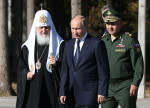Ukraine sanctions 21 Russian Orthodox Church clerics
- Oops!Something went wrong.Please try again later.

President Volodymyr Zelensky signed a decree on Jan. 23, approving a proposal by the National Security and Defense Council to sanction 21 leaders and priests of the Russian Orthodox Church. Among the sanctioned is Mikhail Gundyaev, a nephew of the church's head Patriarch Kirill, who has openly supported Russia's full-scale war against Ukraine.
The list includes 16 top clerics of the Russian Orthodox Church, proposed by Ukraine's Security Service, and six more church members offered by the Cabinet of Ministers.
Some of them are responsible for the Russian Orthodox Church's cooperation with the country's military and law enforcement, public communications. Others are known for publicly justifying Russian aggression against Ukraine and spreading pro-war propaganda.
Sergei Ryakhovsky, the head of the Spiritual Council of the Russian United Union of Evangelical Christians (Pentecostals), was also sanctioned.
"Sanctions have been introduced against 22 people — Russian citizens who support terror and genocidal politics under the guise of spirituality," Zelensky said in his video address on Jan. 23.
In June, Patriarch Kirill said that Russian troops fighting against Ukraine were "protecting Russia…guided by an inner moral feeling based on the Orthodox faith." Earlier, he denied Moscow's aggression against Ukraine, saying that Russia "has never attacked anyone."
During Russia's full-scale invasion, the Russian Orthodox Church has also illegally annexed two dioceses of its autonomous Ukrainian branch - the Crimean diocese and the Rovenki diocese in Luhansk Oblast - in parallel with Russia's illegal annexation of Ukrainian regions. Previously they were subordinated to the Moscow-affiliated metropolitan of Kyiv, but now they are controlled directly by Patriarch Kirill.
In December, Ukraine also sanctioned leaders and clergy members of the Ukrainian Orthodox Church- Moscow Patriarchate (UOC-MP), an affiliate of the Russian Orthodox Church, which was subject to multiple SBU raids earlier.
During these raids, the SBU found Russian propaganda and xenophobic literature, Russian passports belonging to senior clergy, and documents with pro-Russian ideological messages at the premises of the UOC-MP.
